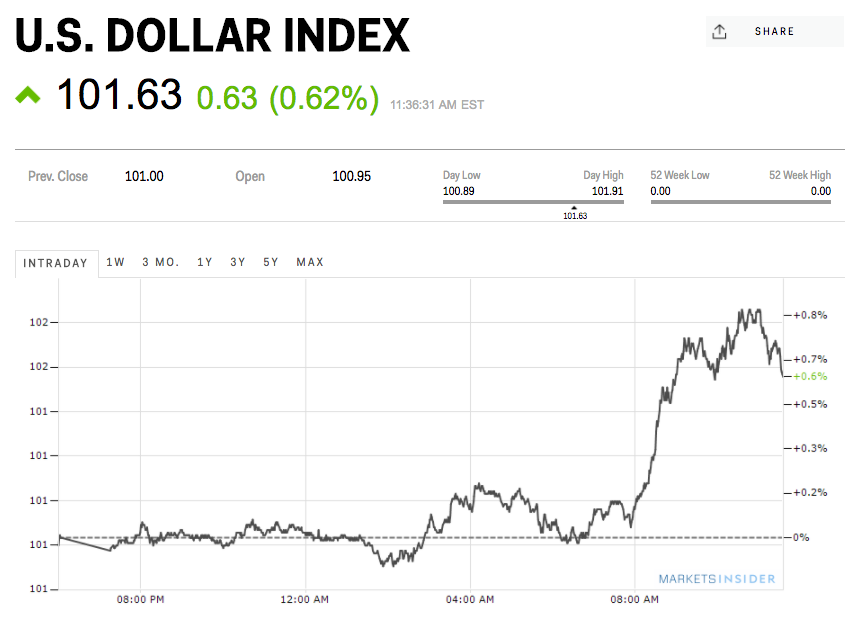The US dollar has been on a tear since Donald Trump’s election in early November.
And the US dollar index has extended its gains on Wednesday. It is up by 0.6% at 101.63 as of 11:47 a.m. ET, around 14-year highs.
At least part of that strengthening could be attributed to the markets reacting to Trump’s proposed fiscal policy initiatives.
However, going forward, there are other things to keep in mind with respect to the greenback.
“We would not argue with the logic and our revised forecasts since the election incorporate a stronger USD,” and HSBC team led by strategist Daragh Maher wrote in a note to clients. “Nonetheless, there are many moving parts to the Trump policy agenda and the market risks missing drivers in its myopic focus on fiscal policy alone.”
More concretely, HSBC detailed four items, noting that it's not a 100-percent-guarantee that the index will keep advancing:
Fiscal policy - positive for the dollar. HSBC thinks that Trump's proposed looser fiscal policy will be a positive for the greenback because they believe that the boost to interest rates will be greater than any negatives resulting from higher inflation and a wider current account deficit. Overseas income repatriation policy - positive for the dollar. The team argues that any increase in repatriation flows should be positive for the dollar. Although, they added that "in reality it is hard to make a defensible estimate of the likely scale of the USD impact" given that it's unclear how much of the overseas pool of profits is already in dollars. Trade policy - ambiguous for the dollar against the G10, but likely stronger against EM. Trump has maintained a strong anti-trade position throughout the campaign, and more recently announced that he will pull out of the Trans-Pacific Partnership on his first day in office. "One of the great fears for emerging markets ahead of the election was that a Trump victory could push the world towards a trade war," wrote the HSBC team. "That remains a possibility and one which would likely carry USD negative implications." Immigration policy - negative for the dollar against the G10. Trump has been firmly in favor of deporting undocumented immigrants. In economic tems, that would mean a reduction of the labor supply, and HSBC argues that this could lead to an "adverse implication" for growth - which could then be negative for the dollar.
The policies "point to USD strength over all," they argued. However, it's also possible that, over time, the fiscal expansion could turn into a negative for the dollar if markets eventually start to worry about rising debt levels.
"This could then join any USD drag from the structural headwinds of a trade war or aggressive immigration policy. But such dynamics are likely to take time to unfold, if at all, and so our forecasts dwell instead on near-term strength for the USD," the HSBC team wrote.
Separately, it's worth noting that a stronger dollar is not necessarily good for US companies with heavy international exposure. In fact, over the last few quarters, US companies have blamed the stronger dollar on weaker profits.
In an interview with CNBC's "Squawk on the Street" on Wednesday, Meg Whitman, the CEO of Hewlett Packard Enterprise, explained why that is in greater detail:
"The currency headwinds are very real. Because when the dollar is strong, our goods are more expensive overseas. And so, let's say someone in Europe was going to buy 1,000 servers, now maybe they'd only buy 800 because the dollar is so strong. So, listen, we've got to manage that. That's part of our new reality. We've got to get our cost structure in line."
Ultimately, everything will depend on what Trump actually does going forward. Or, as the HSBC team put it: "Following the building blocks of Trump policy as they become clearer will help drive a more accurate assessment of USD prospects over time."

